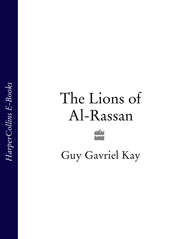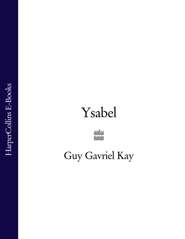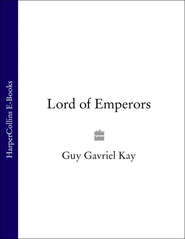По всем вопросам обращайтесь на: info@litportal.ru
(©) 2003-2025.
✖
River of Stars
Настройки чтения
Размер шрифта
Высота строк
Поля
There were gains and losses in most things. Speed against control represented a difference to be adjusted for. It would be different with his bow, he decided. Precision was imperative there, though speed would also matter for an archer facing many foes. He was exceptionally good with a bow, though the sword had been by far the more honoured weapon in Kitai in the days (gone now) when fighting skills were respected. Barbarians like the Kislik or Xiaolu killed from horseback with arrows, then raced away like the cowards they were.
His brother didn’t know he had a bow or he’d have claimed it for himself as Eldest Son. He would then, almost certainly, have broken it, or let it be ruined, since bows needed caring for, and Ren Tzu wasn’t the caring-for sort.
It had been his teacher who had given the bow to Daiyan.
Tuan Lung had presented it to him one summer afternoon a little more than a year ago, alone, after classes were done for the day, unwrapping it from an undyed hemp cloth.
He’d also handed Daiyan a book that explained how to string it properly, care for it, make arrow shafts and arrowheads. It marked a change in the world, in their Twelfth Dynasty, having books here. Teacher Tuan had said that many times: with block printing, even a sub-prefecture as remote as theirs could have information, printed poems, the works of the Master, if one could read.
It was what made a school such as his own possible.
It had been a private gift: the bow, a dozen iron arrowheads, the book. Daiyan knew enough to hide the bow, and then the arrows he began to make after reading the book. In the world of the Twelfth Dynasty, no honourable family would let a son become a soldier. He knew it; he knew it every moment he drew breath.
The very thought would bring shame. The Kitan army was made up of peasant farmers who had no choice. Three men in a farming household? One went to the army. There might be a million soldiers, even more (since the empire was at war again), but ever since savage lessons learned more than three hundred years ago it was understood (clearly understood) that the court controlled the army, and a family’s rise to any kind of status emerged only through the jinshi examinations and the civil service. To join the army, to even think (or dream) of being a fighting man, if you had any sort of family pride, was to disgrace your ancestors.
That was, and had been for some time, the way of things in Kitai.
A military rebellion that had led to forty million dead, the destruction of their most glittering dynasty, the loss of large and lucrative parts of the empire … That could cause a shift in viewpoint.
Xinan, once the dazzling glory of the world, was a sad and diminished ruin. Teacher Tuan had told them about broken walls, broken-up streets, blocked and evil-smelling canals, fire-gutted houses, mansions never rebuilt, overgrown gardens and market squares, parks with weeds and wolves.
The imperial tombs near the city had been looted long ago.
Tuan Lung had been there. One visit was enough, he’d told them. There were angry ghosts in Xinan, the charred evidence of old burning, rubble and rubbish, animals in the streets. People living huddled in a city that had held the shining court of all the world.
So much of their own dynasty’s nature, Teacher Tuan told them, flowed like a river from that rebellion long ago. Some moments could define not only their own age but what followed. The Silk Roads through the deserts were lost, cut off by barbarians.
No western treasures flowed to Kitai now, to the trading cities or the court in Hanjin. No legendary green-eyed, yellow-haired dancing girls bringing seductive music. No jade and ivory or exotic fruits, no wealth of silver coins brought by merchants to buy longed-for Kitan silk and carry it back west on camels through the sands.
This Twelfth Dynasty of Kitai under their radiant and glorious emperor did not rule and define the known world. Not any more.
Tuan Lung had taught this to that same handful of them (never in class). In Hanjin, at the court, they still claimed to rule the world, he said, and examination questions expected answers that said as much. How does a wise minister use barbarians to control barbarians?
Even when they carried wars to the Kislik, they never seemed to win them. Recruited farmers made for a large army but not a trained one, and there were never enough horses.
And if the twice-yearly tribute paid to the much more dangerous Xiaolu in the north was declared to be a gift, that didn’t change what it really was, their teacher said, over his end-of-day wine. It was silver and silk spent to buy peace by an empire still rich, but also shrunken—in spirit as well as size.
Dangerous words. His students poured wine for him. “We have lost our rivers and mountains,” he sang.
Ren Daiyan, fifteen years old, dreamed at night of glory, swung a bamboo sword in a wood at dawn, imagined himself the commander sent to win their lost lands back. The sort of thing that could only happen in a young man’s imagining.
No one, Teacher Tuan said, played polo, perfecting their horsemanship, in the palace or parks of Hanjin the way they had once in Xinan’s walled palace park or city meadows. Red- or vermillion-belted civil servants didn’t pride themselves on their riding skills, or train with swords or bows, vying to best each other. They grew the nails on the little fingers of their left hands to show the world how they disdained such things, and they kept the army commanders firmly under their thumbs. They chose military leaders from their own cultured ranks.
It was when he’d first heard these things, the boy Daiyan remembered, that he’d begun coming to this grove when tasks and rain allowed, and cutting himself swords. He’d sworn a boy’s oath that if he passed the examinations and arrived at court he’d never grow his little fingernail.
He read poetry, memorized the classics, discussed these with his father, who was gentle and wise and careful and had never been able even to dream of taking the examinations.
The boy understood that Teacher Tuan was a bitter man. He had seen it from the beginning of his time in the academy, a clerk’s clever younger son being taught to write properly, learn the teachings of the Masters. Clever, diligent, a good brush stroke already. Perhaps a genuine candidate for the examinations. His father’s dream for him. His mother’s. So much pride, if a family had a son do that. It could set them on a road to fortune.
Daiyan understood this. He’d been an observant child. He still was, at the edge of leaving childhood behind. Later this same day, in fact, it would end.
After three or four cups of rice wine, their honourable teacher had sometimes begun reciting poems or singing sad songs about the Xiaolu’s conquest of the Fourteen Prefectures two hundred years ago—the Lost Fourteen—the lands below the ruins of the Long Wall in the north. The wall was a meaningless thing now, he told his pupils, wolves running through it, sheep grazing back and forth. The songs he sang distilled a heart-torn longing. For there, in those lost lands, lay the surrendered soul of Kitai.
So the songs went, though they were dangerous.
Wang Fuyin, sub-prefect in that same town of Shengdu, Honglin prefecture, Szechen province, in the twenty-seventh year of the reign of Emperor Wenzong of the Twelfth Dynasty, was rendered more unhappy, later that morning, than he could express.
He was not diffident about expressing himself (unless he was reporting to the prefect, who was from a very good family and intimidated him). But the information that had just arrived was so unwelcome, and so unambiguous in what it demanded of him, that he was left speechless. There was no one around to abuse, in any case—which was, in fact, the essence of the problem.
When someone came to any yamen in Kitai from any village bringing an allegation of murder, the sequence of actions to be followed by the civil administration at that yamen was as detailed as anything could be in a famously rigid bureaucracy.
The sub-prefecture sheriff would leave for the village in question with five bowmen to protect him and keep order in what might turn out to be an unruly location. He would investigate and report. He was obliged to set out the same day if word reached the yamen before midday, or at dawn the next morning if otherwise. Bodies decomposed rapidly, suspects fled, evidence could disappear.
If the sheriff should be elsewhere engaged when such a message arrived (he was, today), the judicial magistrate was to go himself to investigate, with the five bowmen and within the same time constraints.
If the magistrate, for whatever reason, was also absent or indisposed (he was), the sub-prefect was tasked with the immediate journey and inquiry, including any inquest required.
That, alas, meant Wang Fuyin.
No lack of clarity in the regulations. Failure to comply could mean strokes with the heavy rod, demotion in rank, even dismissal from civil office if your superiors disliked you and were looking for an excuse.
Civil office was what you dreamed of after passing the jinshi examinations. Being given a sub-prefect’s position, even in a far western wilderness, was a step, an important step, on a road that might lead back to Hanjin, and power.
You didn’t want to fail in something like this, or in anything. It was so easy to fail. You might pick the wrong faction to align with, or have the wrong friends at a viciously divided court. Sub-prefect Wang Fuyin had no friends at court yet, of course.
There were three clerks at the yamen this morning, filing, reading correspondence, adding up tax ledgers. Local men, all of them. And all of them would have seen a miserable, frightened peasant arrive on his donkey, muddy and wet, before midday, then heard him speak of a man slain in Guan Family Village—most of a day’s long, awkward, dangerous ride east towards the Twelve Peaks.
Probably more than a day, Wang Fuyin thought: which meant staying overnight along the way in some sodden, flea-and-rat-infested hovel without a floor, animals kept inside, a handful of bad rice for his meal, rancid wine or no wine, thin tea, while tigers and bandits roared in the cold night.
Well, bandits were unlikely to roar, Fuyin corrected himself (a fussy, precise man), but even so …
He looked at the pale, emerging sun. It had rained lightly overnight, third night in a row, thank the gods, but it was turning into a mild autumn day. It was also, undeniably, still morning, and the clerks would know the protocols.
The sheriff had gone north two days ago to deal with taxation arrears towards the hill passes. Sometimes a chancy exercise. He had taken eight bowmen. He was supposed to have five, but he was a cowardly man (in Wang Fuyin’s view), and though he’d claim he was training the newer ones, he was just increasing his own protection. In addition to farmers unhappy about taxes, bandits in the west country were endemic. Bandits were everywhere in Kitai, really, and there were always more in times of hardship. There existed texts on how to deal with outlaws (Fuyin had read some on the long journey west), but since arriving, he’d decided the texts were useless. You needed soldiers and horses and good information. None of these were ever present.
Neither was the judicial magistrate, Wang Fuyin sometimes felt.
Having taken his own escort of five bowmen, their honourable magistrate was on his monthly three-day “retreat” at the nearby Five Thunder Abbey of the Sacred Path, seeking spiritual enlightenment.
It seemed that he had negotiated this privilege from the prefect (Wang Fuyin had no idea how) years before. What Fuyin knew, having arranged to know it, was that the magistrate’s path to enlightenment consisted mainly of time spent among the women (or one particular woman) at the convent adjacent to the abbey.
Fuyin was extremely jealous. His wife, from a better family than his own and not shy about reminding him, had been deeply unhappy to be posted here. She’d made him aware of that on the journey, and on a daily basis since they’d arrived a year ago, her words like the tedious dripping of rainwater from the eaves of their small house.
The one singing-girl place in Shengdu was dismally unpalatable for a man who had known the best houses in the pleasure district of the capital. Wang Fuyin didn’t make nearly enough money to afford a concubine, and had yet to figure out how to arrange his own spiritual retreats to the convent by the Five Thunder Abbey.
It was a hard life he lived.
The village messenger, he saw, had led his donkey to the water trough in the space in front of the yamen and was letting it drink. He was also drinking himself, head down beside the donkey’s. Wang Fuyin kept his face impassive, fastidiously adjusted the sleeves and collar of his robe, and strode into the yamen.











